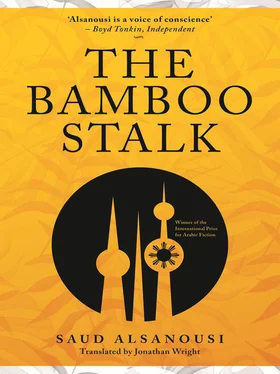Khawla was enthralled by the story of Rizal and listened to me with interest. When I’d said what I had to say, she said, ‘When Father said he wanted to change reality by writing, he wasn’t crazy like Grandmother says.’ She bowed her head, then continued, ‘If only he’d finished his novel before he was captured.’ She looked at my face thoughtfully. ‘If only people here read,’ she added.
* * *
The fact that I had good relationships with Khawla and Ghassan didn’t stop me from feeling lonely. A kind of barrier stood between us, even if it was a barrier full of gaps. Khawla had the same feeling. She felt alone although she was surrounded by Grandmother and our aunts. When I asked her one day how she fought against this feeling of hers, she surprised me with her answer. ‘Whenever I feel the need for someone to talk to, I open a book,’ she said.
I thought a while, then I said, ‘But books don’t listen.’
‘When I was little, Miri was the person closest to me. She always listened to me even if she wasn’t able to do anything,’ she replied. ‘That didn’t last long,’ she added, bowing her head. ‘My relationship with Miri upset Grandmother. She forbade me from talking to her.’ Her smile returned. ‘But I found an alternative,’ she continued.
I looked at her inquiringly, encouraging her to continue.
‘If I need to tell someone all the things I’m too embarrassed to reveal. .’ She stopped and smiled and winked at me. ‘Then I tell Aziza,’ she continued, ‘she’s the one who listens to me best.’
‘Aziza? Who’s she?’ I asked her in puzzlement.
Khawla walked towards the glass door. ‘Wait a moment,’ she said. ‘It’s a good opportunity to introduce you to her.’
She came back a minute later with a lettuce leaf in her hand and put it on the carpet in the middle of the sitting room. Then she sat on the sofa. ‘Let’s wait a while. She’s rather slow,’ she said.
We didn’t have to wait more than three minutes before a tortoise appeared from under one of the sofas in the corner, the size of an average soup bowl. It walked slowly towards the lettuce leaf in the middle of the carpet. Khawla pointed to the tortoise, turned to me and said, ‘Aziza.’
I nodded in delight. ‘Pleased to meet you,’ I said.
16
On 24 September 2006, Ramadan began. I really suffered during the month — the hunger, the thirst and the people.
Since I was Muslim as far as my family was concerned, I had to fast. And because I was willing to perform any ritual that might bring me close to God, even if I didn’t know what religion I was, I had to fast. I envied the Muslims their ability to tolerate the hunger and thirst. It’s admirable. But for me it was impossible. I managed to fast five hours the first day, six hours the second day and eight hours the third day. Then I fasted the whole of the fourth day. I jumped for joy when I heard the call to prayer at sunset from the local mosques and on the telephone — ‘ Allahu akbar, Allahu akbar ’ — marking the end of the fast for the day.
After iftar on the first day I fell fast asleep on my bed, almost unconscious. No one inside the house talked. Khawla, Hind and Grandmother sat for hours in front of the television, moving from their seats only to pray. I hadn’t noticed they were so interested in television until it was Ramadan. There was also a lot of praying in the month. Even late at night I saw light from the window of Grandmother’s room. Khawla said Grandmother prayed all night.
Ghassan had strange rituals in Ramadan. He didn’t like to stay in his flat during the day. He would call me after he came out of work. ‘Get changed. I’m on my way,’ he would say. We spent the time before iftar in a different place every day: the Mubarakiya souk, the fish market, the meat and fruit and vegetable market, the Friday market, the pet and bird market, the market for Iranian goods.
As usual I looked at people’s faces and facial expressions. During the day in Ramadan they looked different. People were tense when driving and honked their horns for the slightest reason. They put their arms out of the windows and waved them angrily. They looked sullen. ‘Ghassan?’ I said one day. He turned to me. ‘Does smiling during the day in Ramadan mean you’re not fasting?’ I asked.
One day, a little before sunset, Ghassan and I were in the pet and bird market and I saw a tortoise just like Aziza. I bought it without thinking. I held it in my hands and began to strike up a friendship. I had a strange need for animals at that time. There were so many animals on Mendoza’s land — the old dog Whitey, the cocks, the cats, the birds, the frogs and the lizards, but I hadn’t before felt how important these creatures are.
At home I was with the tortoise in my room. ‘ Allahu akbar, Allahu akbar .’ It was the call to prayer and time to break the fast. I’d forgotten I was hungry and what time it was. Khawla knocked on the door. ‘Aren’t you fasting?’ she asked, pushing in the door of my room. ‘It’s time to eat.’ She gaped in amazement when she saw the tortoise.
‘How did Aziza get into your room?’ she asked.
I shook my head. ‘That’s not Aziza,’ I corrected her.
The tortoise had to have a name, so I made one up on the spot. ‘That’s Inang Choleng.’
* * *
If I got bored in Grandmother’s house, and I often did, I would meet the servants secretly in the kitchen and chat with them, on my guard against being discovered.
When I saw the conditions the servants worked under in the house I felt sorry for my mother and wondered how she had put up with it years ago. But compared with the fate that awaited her in the Philippines, the hardship of working in Kuwait must have counted as luxury. The servants worked from six in the morning to ten o’clock at night. Babu said that in some of the houses nearby they didn’t have set work hours. The hours depended on the needs of the household. Any time someone in the family needed something, they had to be fully prepared to respond. Wily Raju was the one who worked least. All he did was drive Grandmother around if she had to go out, which didn’t happen often, and sometimes go out to buy stuff from the central market. In the morning he washed the car and the courtyard and watered the trees in the area opposite the house. I noticed that Raju enjoyed a weekly day off. Babu and his wife Lakshmi had a day off once a month while Luzviminda worked every day.
In one of my furtive meetings with them in the kitchen, I asked Luzviminda why she worked like an automaton without a single day off outside the house. She replied, ‘When I asked the old lady that, her argument was “If I let you go out, how can I be sure you won’t come back pregnant within months.” She didn’t realise that if I wanted I could do that here, in her house.’ Then she started criticising Grandmother.
Babu didn’t like Luzviminda criticising, and neither did Lakshmi. Babu said, ‘Mama Ghanima is an old woman, like my mother. If she was that bad I wouldn’t have stayed in her house close to twenty years.’ His wife agreed with him, so Luzviminda held her tongue.
17
One evening during Ramadan, just before the middle of the month, the family gathered at Grandmother’s house for a special meal that comes between the iftar at sunset and the suhour before dawn. They called it the ghabqa . I was in my room with Inang Choleng. From behind the curtain over the window I could see the kids in the courtyard — the children of Awatif and Nouriya. In the meantime everyone else was inside — Awatif and her husband Ahmad, Nouriya and her husband Faisal, Hind, Khawla, Grandmother and her older grandchildren. The door bell rang every now and then. Lots of children gathered at the door, wearing special clothes. The boys were wearing traditional white thobes with sleeveless jackets; some had skullcaps on while others wore the same white headdress as the men. The girls were wearing different clothes: a light piece of cloth with golden decoration covering their heads and the top half of their bodies. All the children, boys and girls, had cloth bags hanging round their necks. Hind stood at the door with Lakshmi and Luzviminda on either side carrying large bags of nuts and sweets. The children sang in unison and clapped at the door. The songs ended with generous donations of nuts and sweets to go into their bags. The children kept coming to Grandmother’s door for three days in succession.
Читать дальше












